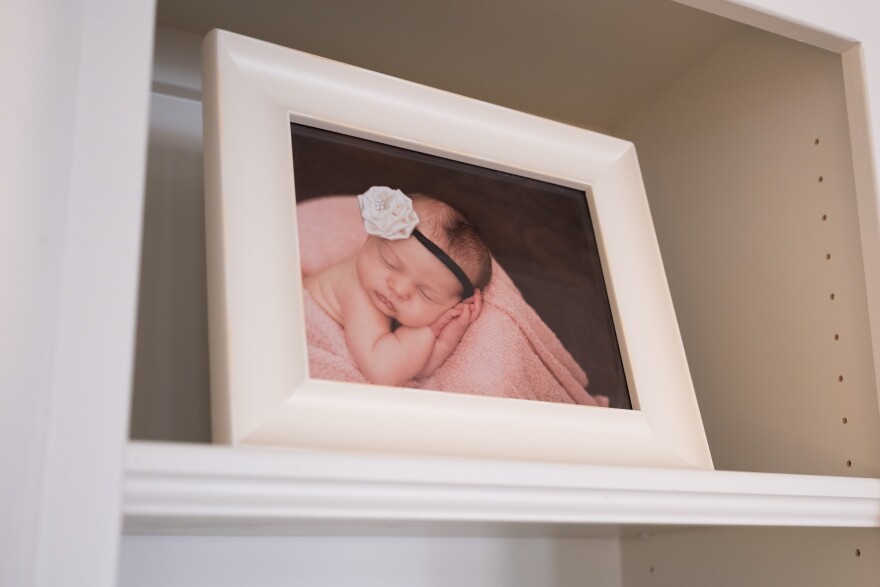Eleven-year-old Marley Mansour loves baseball. She's in a kids league, and for every game she has a signature outfit — a different colored tutu every time she plays.
She also loves bubbles and going to church. Her favorite food isn't pizza; it's "pizza pie with pepperoni."
When Marley was a baby her parents noticed she wasn't putting on weight, and walking was a struggle. She fell a lot and had several seizures. Marley also would throw up almost every meal.

"We saw so many doctors, we saw so many specialists, and there was never any answer," her mother, Kayla Mansour, said. "It definitely was a very lonely path, to be honest."
Finally, when Marley was 9, they got an answer: Genetic testing showed she was born with a mutation in a gene called NARS1. It's involved in making a protein that's critical for the central nervous system – but it wasn't identified until 2020.
"There wasn't a road map. I didn't know the resources yet. I didn't know the places to look," Kayla Mansour said. "It was quite the journey, waiting nine and a half years to all of a sudden having a name for it."
A NARS1 mutation can lead to developmental delays, like with speech. Those affected may have seizures, intellectual disabilities, and problems with their nerves. Marley is one of about 100 people in the world known to have the condition.
The day Marley finally got her diagnosis, doctors told her mom there wasn't a cure. She was already in physical, occupational and speech therapy as well as swimming. Marley saw a neurologist and tried anything her family had access to.

But Kayla Mansour was determined to find anything. That's when she discovered a nonprofit that creates individual treatments for rare diseases.
Later this year, Marley may become the first person in the world to receive personalized therapy for her disease.
"It modifies the NARS1 gene to help her to be able to make that protein products when previously she was not," said Dr. Kaitlin Batley, Marley's doctor. She's a pediatric neuromuscular neurologist and director of the Pediatric Neuromuscular program at UT Southwestern and Children's Health in Dallas.
The therapy was developed for a variety of diseases but has never been used to treat Marley's particular genetic mutation. Batley thinks this is a step forward for the medical community.
"It is something that also shows kind of the personalized medicine and direction for personalized medicine for the future, that we may be able to create therapies for diseases that previously had none," said Batley.
Marley will need an injection in her spine every few months for the rest of her life. The hope is to slow the progression of her disorder. Her mom acknowledges there are a lot of unknowns with the treatment – including whether it'll even work.
"I just have a lot of gratitude, but I also am nervous as well. I've never even given this child an antibiotic. And here I am, you know, going to infuse an experimental medicine into her spine," Kayla Mansour said. "We don't know what we'll get out of the treatment, but we are just so hopeful that it's going to improve her quality of life at a minimum."

Despite fears, Marley's dad, Jonathan Mansour, said he's happy his daughter will pioneer the treatment for other people.
"We're excited about it," he said. "A little bit nervous, but for the greater goal, I think it's a good thing for us and a lot of other kids."
The medication Marley will receive is free, but the administrative costs aren't. The family has a support registry in Marley's name going up to $100,000.
"Insurance is not going to pitch in because it's experimental for a couple of years. All these things that we're having to navigate and now a six-figure amount to make sure our daughter can live a better life," Kayla Mansour said. "We don't know how we're going to do it, but we're sure going to try to figure it out."
Marley's the oldest of three children. Her parents haven't told any of their kids – including Marley — about her condition. Jonathan and Kayla Mansour want to focus on them being children.
They hope one day, Marley is able to understand everything she overcame.
Olla Mokhtar is KERA's news intern. Got a tip? Email Olla at omokhtar@kera.org.
KERA News is made possible through the generosity of our members. If you find this reporting valuable, consider making a tax-deductible gift today. Thank you.
Copyright 2025 KERA


